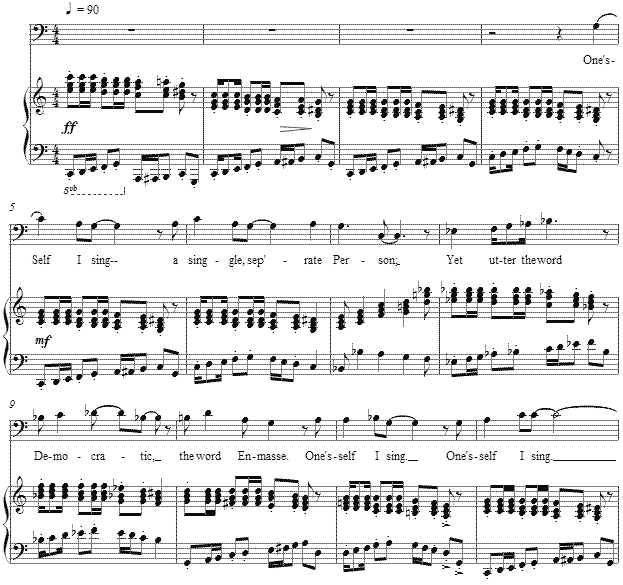Music and Texts of GARY BACHLUND
Vocal Music | Piano | Organ | Chamber Music | Orchestral | Articles and Commentary | Poems and Stories | Miscellany | FAQs
One's-Self I Sing - (2009)
Walt Whitman
for baritone and piano
One’s-Self I sing—a simple, separate Person;
Yet utter the word Democratic, the word En-masse.
Of Physiology from top to toe I sing;
Not physiognomy alone, nor brain alone, is worthy for the muse—
I say the Form complete is worthier far;
The Female equally with the male I sing.
Of Life immense in passion, pulse, and power,
Cheerful—for freest action form’d, under the laws divine,
The Modern Man I sing.[ 4 pages, circa 2' 30" ]
Walt Whitman
The text is from Leaves of Grass, and had gone through revisions by Whitman from initial through subsequent editions. He thought this particular text, in a later revision, important enough to serve as the "Inscription" to the fourth edition of Leaves of Grass. [ 1 ] One commentator notes, "In a modern, democratic society, as Tocqueville had said, no intermediate allegiances stand between the individual citizen and the entire body politic." [ 2 ] We know from Whitman's other texts that individuality was of great value to him, especially in terms of personal freedom. For this another scholar note Whitman's "republican ideals of early-nineteenth-century artisan radicalism, emphasizing the interlinked values of independence and community, personal wealth and commonwealth." [ 3 ] I am indebted to Bruce Perry for calling my attention to this text for a possible song setting, as I was setting Shelley's Music, when Soft Voices die for him especially.
The text seemed to me square-edged, willing to throw a proverbial elbow if need be and powerful. For this a sense of Americana had to fill the musical setting of this text. I chose a square, lightly syncopated vocabulary, which is more complex that seems upon first appearance, as the tonic settles momentarily into E flat for a moment, one example of such "querilities," a word of Whitman's which bespeaks that individuality which then can be seen as part of the collective. Of course, no collective which crushes individuality can long stand, for radical equality and "passion, pulse, and power" come from the individual. This is a celebration of "One's-Self," with the hyphen as Whitman chose to spell it, suggesting to me that the One and self are inseparable. The up tempo feel to the setting could be quicker than noted, but clarity of the text should be paramount.
The score for One's-Self I Sing is available as a free PDF download, though any major commercial performance or recording of the work is prohibited without prior arrangement with the composer. Click on the graphic below for this piano-vocal score.
NOTES
[ 1 ] The final version of this text is as follows:
Small is the theme of the following Chant, yet the greatest -- namely,
ONE'S SELF -- that wondrous thing, a simple, separate person.
That, for the use of the New World, I sing.
Man's physiology complete, from top to toe, I sing. Not
physiognomy alone, nor brain alone, is worthy for the muse; -- I
say the Form complete is worthier far. The female equally with the male, I sing.
Nor cease at the theme of One's-Self. I speak the word of the
modern, the word EN-MASSE.
My Days I sing, and the Lands -- with interstice I knew of helplessWar.
O friend, whoe'er you are, at last arriving hither to commence, I feel
through every leaf the pressure of your hand, which I return. And
thus upon our journey link'd together let us go.
[ 2 ] In "On 'One's Self I Sing,'" by James Dougherty, from Walt Whitman and the Citizen’s Eye (Louisiana State UP, 1993), 140.
[ 3 ] Betsy Erkkila, in Whitman the Political Poet, Oxford University Press, 1989.

